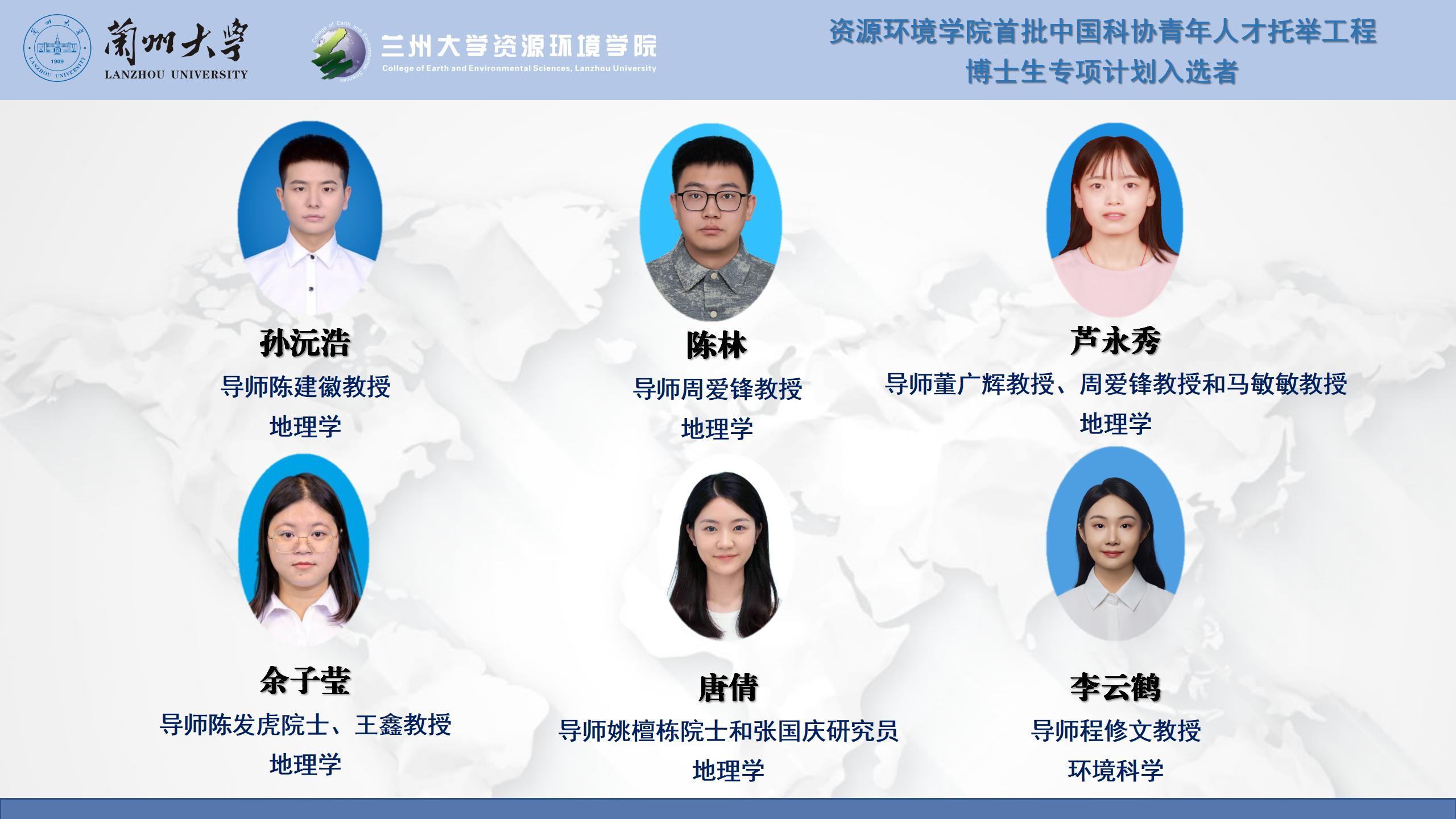In September 2024, the China Association for Science and Technology (CAST)launched the2024 Young Talent Support Program - Doctoral Student Special Initiative. After a rigorous selection process involving faculty-level screening, university andGansu Provincial Association for Science and Technologyevaluations, and final approval byCAST, six PhD students from theSchool of Earth and Environmental Sciences—Yuanhao Sun, Lin Chen, Yongxiu Lu, Ziying Yu, Qian Tang, and Yunhe Li—were successfully selected as members of the first batch of this prestigious program.

The following are brief profiles of the selected students:
Yuanhao Sunfocuses onquantitative reconstruction of paleoclimate and environment, with a primary interest in reconstructingancient vegetation and land cover changes in East Asiaand their response mechanisms. His research has resulted ineight papers published as first or corresponding author in Quaternary Science Reviews, Catena, and other journals. He has also leda National Natural Science Foundation (NSF) Youth Basic Research Project (for PhD students)and afundamental exploratory research project funded by the Central Universities.
Lin Chenspecializes inbiogeochemistry and climate change, focusing onhydrological evolution patterns and temperature change trends in eastern China's monsoon region since the Last Glacial Termination. To date, he has published four first-author papers in Communication Earth & Environment, Quaternary Science Reviews, and Global and Planetary Change.
Yongxiu Luconducts research inenvironmental archaeology and changes in human living environments, primarily investigating theintensity of human activity and environmental changes in Xishuangbanna before and after the Last Glacial Maximum (LGM). He has published five first-author or corresponding-author papers in Quaternary Science Reviews, Acta Anthropologica Sinica, and other journals. Additionally, he has been awarded one NSF Youth Basic Research Project (for PhD students)and one research capacity enhancement project (Qingke Program) funded by the Central Universities.
Ziying Yu focuses on the formation and evolution of deserts in Central Asia’s arid regions. Over the past three years, she has ledenvironmental drilling projects in the core area of the Taklamakan Desertand utilizedsedimentology, chronology, and physicochemical indicatorsto reconstructthe environmental history of the desert over the past 1.8 million years. Her research has uncoveredspatial heterogeneity in the formation and evolution of China's deserts, with findings published in Science Bulletin, Science China: Earth Sciences, and Journal of Desert Research.
Qian Tang is dedicated toapplying artificial intelligence in geosciences, developing adeep-learning-based method for automatic ice lake extraction. This method significantly enhances the identification of small ice lakes undercomplex conditionssuch asshadows, ice cover, freezing, and turbidityin alpine cold environments, providing critical scientific support forice lake outburst flood risk assessment and water resource management. Her work has been published inRemote Sensing of Environment(a top-tier journal in the Chinese Academy of Sciences’ Q1 category) and theChinese core journal Science Bulletin.
Yunhe Li specializes in environmental functional materials, focusing on the application of single-atom materials for pollutant adsorption and advanced oxidation in water treatment. To date, he has publishedeight SCI-indexed papersasfirst author or co-first author in Chemical Engineering Journal, Separation and Purification Technology, Chinese Chemical Letters, Journal of Environmental Chemical Engineering, and Journal of Water Process Engineering, all leading journals in environmental science.
The CAST Young Talent Support Program - Doctoral Student Special Initiative targets senior PhD students under the age of 30 in science, engineering, agriculture, and medical disciplines from universities and research institutions. It provides selected candidates with organizational support, academic affiliations, and financial assistanceto foster their academic growth. The initiative aims to help young scientists expand their expertise, broaden their perspectives, and enhance their capabilities, accelerating the development ofinnovative young scientific talent. It also seeks torevolutionize the discovery, selection, and cultivation mechanisms for young scientific talents, aligning with China’snational strategy for scientific and technological advancement.
The selected candidates will receive specialized training from January 2025 to December 2026, focusing on expanding academic horizons, enhancing research skills, and accelerating scholarly growth. The program is managed collaboratively by CAST, national academic societies, provincial science and technology associations, and university science and technology associations. CAST will providefunding support for participants to attend high-level academic conferences, publish high-impact research papers, and engage in international (overseas) academic exchanges and research visits.
Congratulations to the selected students and their advisors!